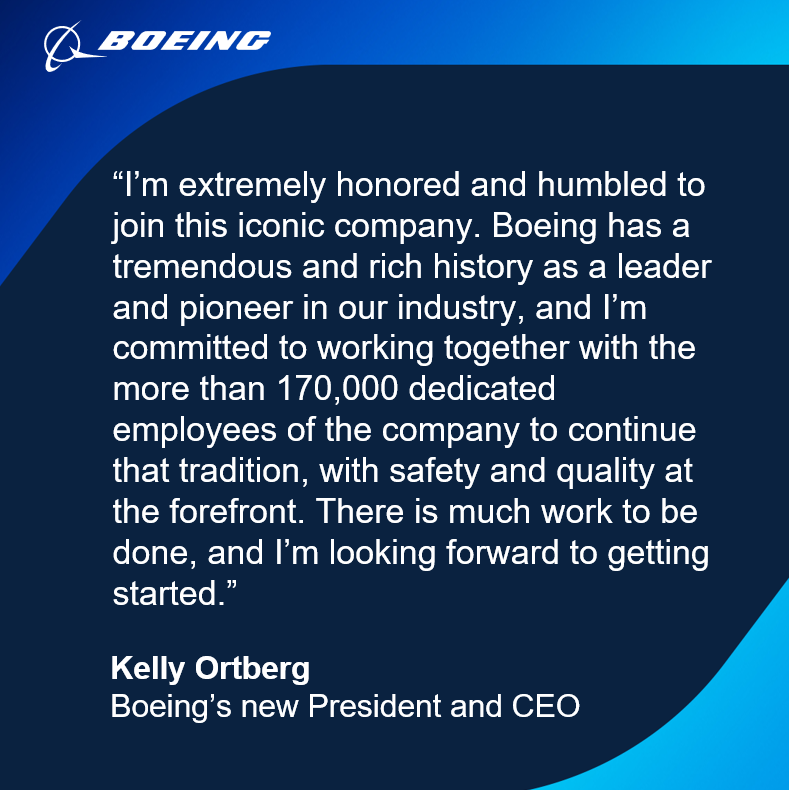
Boeing today announced that its Board of Directors has elected Robert K. “Kelly” Ortberg as the company’s new president and chief executive officer, effective August 8, 2024. Ortberg will also serve on Boeing’s Board of Directors.
He will succeed Dave Calhoun, who earlier this year announced his intention to retire from the company, having served as president and CEO since January 2020, and as a member of Boeing’s Board of Directors since 2009.

“The Board conducted a thorough and extensive search process over the last several months to select the next CEO of Boeing and Kelly has the right skills and experience to lead Boeing in its next chapter,” said Steven Mollenkopf, Chair of the Board. “Kelly is an experienced leader who is deeply respected in the aerospace industry, with a well-earned reputation for building strong teams and running complex engineering and manufacturing companies. We look forward to working with him as he leads Boeing through this consequential period in its long history.”
“The Board would also like to thank Dave Calhoun for his strong leadership at Boeing, first as Chair and then as CEO, when he stepped in to steer the company through the challenges of recent years,” added Mollenkopf.
“I’m extremely honored and humbled to join this iconic company,” said Ortberg. “Boeing has a tremendous and rich history as a leader and pioneer in our industry, and I’m committed to working together with the more than 170,000 dedicated employees of the company to continue that tradition, with safety and quality at the forefront. There is much work to be done, and I’m looking forward to getting started.”
Ortberg, 64, brings over 35 years of aerospace leadership to this position. He began his career in 1983 as an engineer at Texas Instruments, and then joined Rockwell Collins in 1987 as a program manager and held increasingly important leadership positions at the company prior to becoming its president and CEO in 2013. After five years leading Rockwell Collins, he steered the company’s integration with United Technologies and RTX until his retirement from RTX in 2021. He has held a number of important leadership posts in industry, including serving on the Board of Directors of RTX. Additionally, he serves on the Board of Directors of Aptiv PLC, a global technology company and an industry leader in vehicle systems architecture. He is the former Chair of the Aerospace Industries Association (AIA) Board of Governors.
Ortberg holds a bachelor’s degree in mechanical engineering from the University of Iowa.
On the financial side, the company issued its Second Quarter 2024 results:
- Submitted comprehensive safety and quality plan to the Federal Aviation Administration
- Announced agreement to acquire Spirit AeroSystems in July; transaction expected to close mid-2025
- Revenue of $16.9 billion, GAAP loss per share of ($2.33) and core (non-GAAP)* loss per share of ($2.90)
- Operating cash flow of ($3.9) billion and free cash flow of ($4.3) billion (non-GAAP)*
- Total company backlog of $516 billion, including over 5,400 commercial airplanes
The Boeing Company recorded second quarter revenue of $16.9 billion, GAAP loss per share of ($2.33) and core loss per share (non-GAAP)* of ($2.90) (Table 1). Boeing reported operating cash flow of ($3.9) billion and free cash flow of ($4.3) billion (non-GAAP)*. Results primarily reflect lower commercial delivery volume and losses on fixed-price defense development programs.
“Despite a challenging quarter, we are making substantial progress strengthening our quality management system and positioning our company for the future,” said Dave Calhoun, Boeing president and chief executive officer. “We are executing on our comprehensive safety and quality plan and have reached an agreement to acquire Spirit AeroSystems. While we have more work ahead, the steps we’re taking will help stabilize our operations and ensure Boeing is the company the world needs it to be. We are making important progress in our recovery and will continue to build trust through action and transparency.”
Operating cash flow was ($3.9) billion in the quarter reflecting lower commercial deliveries, as well as unfavorable working capital timing (Table 2).
Cash and investments in marketable securities totaled $12.6 billion, compared to $7.5 billion at the beginning of the quarter driven by the $10.0 billion issuance of new debt partially offset by the usage of free cash flow in the quarter (Table 3). Debt was $57.9 billion, up from $47.9 billion at the beginning of the quarter due to the issuance of new debt. The company has access to credit facilities of $10.0 billion, which remain undrawn.
Total company backlog at quarter end was $516 billion.
Segment Results
Commercial Airplanes
| Table 4. Commercial Airplanes | Second Quarter | First Half | ||||||||||||||||||||||||||||||||||||
| (Dollars in Millions) | 2024 | 2023 | Change | 2024 | 2023 | Change | ||||||||||||||||||||||||||||||||
| Deliveries | 92 | 136 | (32) % | 175 | 266 | (34) % | ||||||||||||||||||||||||||||||||
| Revenues | $6,003 | $8,840 | (32) % | $10,656 | $15,544 | (31) % | ||||||||||||||||||||||||||||||||
| Loss from operations | ($715) | ($383) | NM | ($1,858) | ($998) | NM | ||||||||||||||||||||||||||||||||
| Operating margins | (11.9) | % | (4.3) | % | NM | (17.4) | % | (6.4) | % | NM | ||||||||||||||||||||||||||||
Commercial Airplanes second quarter revenue of $6.0 billion and operating margin of (11.9) percent primarily reflect lower deliveries and planned higher period costs, including research and development (Table 4).
During the quarter, the company submitted its comprehensive safety and quality plan to the Federal Aviation Administration (FAA). The 737 program gradually increased production during the quarter and still plans to increase production to 38 per month by year end. The 787 program maintains plans to return to 5 per month by year end. In July, the company announced an agreement to acquire Spirit AeroSystems, and the 777X program began FAA certification flight testing after obtaining type inspection authorization.
Commercial Airplanes delivered 92 airplanes during the quarter and backlog included over 5,400 airplanes valued at $437 billion.

